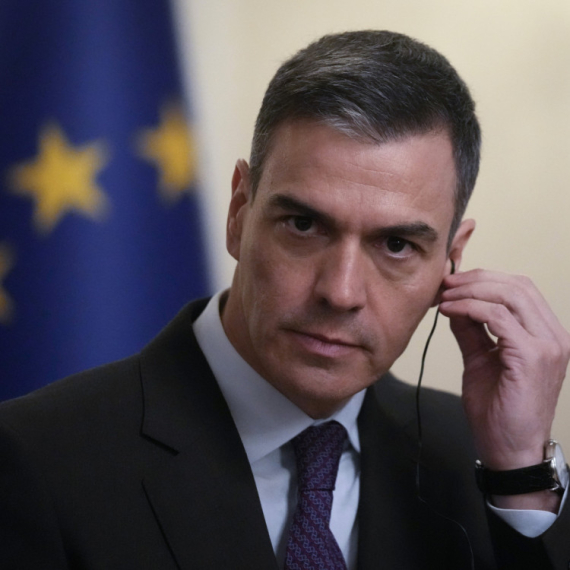Britain's crisis – and Europe's
Sunday, 16.05.2010.
00:07

Britain's crisis – and Europe's They are different matches, but they have much in common. At stake now, both on the island and the continent, is the future of a whole way of organising the economy and society – sometimes called the ‘European social model’ – combining the free play of markets with high levels of public spending, social security, quality of life (long holidays, sickness and maternity leave, early retirement) and, alas, mountainous debt. At stake, too, is the way we organise Europe itself: that postwar ‘European project’ of which, like it or not, Britain is a part. Shortly after 9 am on Monday morning, I heard two of Europe’s sleep-deprived presidents, Jose Manuel Barroso of the European Commission and Herman van Rompuy of the European Council, triumphantly present - to a World Economic Forum audience in Brussels - the ‘shock and awe’ package to save the Eurozone that had been agreed a few hours before. ‘Any attempt to threaten the stability of the Euro will fail,’ said Barroso. Well, we shall see. If I were a bond trader, I would not yet be convinced. To succeed, this deal requires three things: Greece making deep, painful structural reform, Germany being ready to pick up part of the tab, and the whole Eurozone agreeing tighter fiscal coordination and economic governance. Three giant ifs. Van Rompuy told us the Greek government needs to ‘change the culture and even the society in Greece’. A pretty tall order. And in the unlikely case that Greeks suddenly start saving, working and exporting like Germans, that’s still not the answer. If all Eurozone members were to behave like Germans, who would thenbuy their exports? So Germans also have to start spending more themselves – if you will, behaving more like Greeks. That’s a tall order too. Angela Merkel has just lost her majority in the upper house of the German parliament due to a sharp election loss in North Rhine-Westphalia. Broadly speaking, the parties that did best in that German province or Land – which, incidentally, has a larger population and bigger economy than Greece - were those that abstained on or voted against the Greek bail-out. They also resist the cutting back of the German welfare state. ‘Keine Entsolidarisierung der Gesellschaft!’ cried the Social Democratic leader in North Rhine-Westphalia, ‘no desolidarisation of society!’ When even solidarity with your own fellow-Germans is so much under strain, there is none at all left for feckless Greeks taking gifts. Nor is there any appetite in Germany for great leaps forward in European integration. Yet that is precisely what the sleep-deprived presidents of Europe tell us is necessary to overcome this crisis of the Eurozone. ‘In the end, we cannot have a monetary union without an economic union,’ said Barroso at our Monday morning meeting. Van Rompuy went further still: ‘we can’t have a monetary union without some form of economic and – er – political union’. They have economic logic, if not political realism, on their side. In its essentials, this crisis was entirely foretold by the critics of the original design of monetary union in the 1990s. You cannot have a strong, durable monetary union, they said, without a fiscal union, allowing for effective fiscal discipline and compensatory budget transfers across the whole currency area, and without higher levels of labour mobility. But if the Germans, and others, were not willing to go that far then, they are even less minded to do so today. And Merkel, unlike Helmet Kohl, has not led (ie. benignly bullied) them into accepting that they must go further, in the interests of Germany, peace and historical necessity. Altogether, the great postwar drivers of the European project are no longer there. So now there are two $64,000 – or rather Euro 64,000 billion – questions. The first is whether the Eurozone can somehow muddle through to a necessary minimum of shared fiscal discipline and ‘economic governance’, before the bond markets come back to drink more blood - and Greece ends up defaulting, or, more politely, ‘restructuring its debt’, whether inside or finally outside the Eurozone. That is not a question directly to Britain, but Britain’s unprecedented new European-style coalition government cannot be untouched by it. Monday’s bail-out already tangentially involved Britain, inasmuch as we are contributors to that Euro 60 billion of the EU budget against which the EU loan guarantee to Greece is secured. Britain’s Labour finance minister Alistair Darling was here at the ‘Ecofin’ (Economic and Financial Affairs council) table in Brussels at which that decision was made and, as one of his last acts as finance minister, assented to it. When (if) the Conservative George Osborne comes to his first ‘Ecofin’ meeting here next Tuesday, on presumably his first foreign trip as Britain’s new finance minister, he will - if things go according to the French commissioner Michel Barnier’s current plan - be confronted with a very uncongenial directive constraining London’s hedge funds. It’s not directly related to the Eurozone bail-out, but in European minds this all gets mixed up together. How the Liberal Democrats and the Conservatives, the most Europhile and the most Europhobe parties in British politics, can work out a shared approach to this convulsed Europe, God alone knows. And even He is probably scratching his head. Yet if Britain’s biggest single market goes belly-up, you can forget any hope of a rapid British economic recovery. The second big question is whether debt- and deficit-laden European welfare states, including not just Greece, Italy, Portugal and Spain but also Britain – post-Brown Britain – will be capable of rescuing their public finances and reforming their social market economies. For it’s now clearer than ever that the Britain the Scottish social democrat Brown bequeaths, with its high public spending and debt burden, is just a more free market variant of that ‘European social model’. If that model is to be saved, then it has to be changed. The old, rusty gas guzzler must be converted into a new, leaner, meaner but also greener hybrid. The rhetoric I heard from Europe’s presidents, suggesting that the European social model can be preserved simply by people working ‘longer and better’ (Barroso), and still be ‘an example to the world’ (van Rompuy), is wholly inadequate. ‘Europe is Detroit,’ said one businessman here. From Greece to Britain, from Spain (where prime minister Jose Luis Rodriguez Zapatero is just announcing his own round of public spending cuts) to North Rhine-Westphalia, we face a wrenching change in the way we work and live. Slogans, from the British Conservatives’ woolly ‘big society’, through the German Social Democrats’ clunky ‘no desolidarisation’, to the Greek communists’ hairy ‘down with the capitalists’, won’t do the job. In the unavoidable new politics of austerity, the issue is whether this will be merely destructive austerity or also creative austerity. The challenge is a collective one, in the Eurozone, from which Britain can’t entirely stand aside, but also an individual one, to each European country. Britain now stands at this European starting line, in an unfamilar blue and yellow striped vest, with Spain, Greece, Germany and France lined up beside it . Ready, steady, go. timothygartonash.com Protests in Greece (Beta/AP) What a week. While Britain lives one of the greatest political dramas in its postwar history, the continent is convulsed by a historic crisis of the Eurozone. Here in Brussels, I keep flicking to and fro between the two, like someone trying to watch two cliff-hanger Wimbledon tennis finals simultaneously. Timothy Garton Ash "Like Greece, Spain and even Germany, Britain faces the pan-European challenge of remaking its social model in a politics of austerity."
Britain's crisis – and Europe's
They are different matches, but they have much in common. At stake now, both on the island and the continent, is the future of a whole way of organising the economy and society – sometimes called the ‘European social model’ – combining the free play of markets with high levels of public spending, social security, quality of life (long holidays, sickness and maternity leave, early retirement) and, alas, mountainous debt. At stake, too, is the way we organise Europe itself: that postwar ‘European project’ of which, like it or not, Britain is a part.Shortly after 9 am on Monday morning, I heard two of Europe’s sleep-deprived presidents, Jose Manuel Barroso of the European Commission and Herman van Rompuy of the European Council, triumphantly present - to a World Economic Forum audience in Brussels - the ‘shock and awe’ package to save the Eurozone that had been agreed a few hours before. ‘Any attempt to threaten the stability of the Euro will fail,’ said Barroso. Well, we shall see. If I were a bond trader, I would not yet be convinced. To succeed, this deal requires three things: Greece making deep, painful structural reform, Germany being ready to pick up part of the tab, and the whole Eurozone agreeing tighter fiscal coordination and economic governance. Three giant ifs.
Van Rompuy told us the Greek government needs to ‘change the culture and even the society in Greece’. A pretty tall order. And in the unlikely case that Greeks suddenly start saving, working and exporting like Germans, that’s still not the answer. If all Eurozone members were to behave like Germans, who would thenbuy their exports? So Germans also have to start spending more themselves – if you will, behaving more like Greeks. That’s a tall order too.
Angela Merkel has just lost her majority in the upper house of the German parliament due to a sharp election loss in North Rhine-Westphalia. Broadly speaking, the parties that did best in that German province or Land – which, incidentally, has a larger population and bigger economy than Greece - were those that abstained on or voted against the Greek bail-out. They also resist the cutting back of the German welfare state.
‘Keine Entsolidarisierung der Gesellschaft!’ cried the Social Democratic leader in North Rhine-Westphalia, ‘no desolidarisation of society!’ When even solidarity with your own fellow-Germans is so much under strain, there is none at all left for feckless Greeks taking gifts. Nor is there any appetite in Germany for great leaps forward in European integration. Yet that is precisely what the sleep-deprived presidents of Europe tell us is necessary to overcome this crisis of the Eurozone.
‘In the end, we cannot have a monetary union without an economic union,’ said Barroso at our Monday morning meeting. Van Rompuy went further still: ‘we can’t have a monetary union without some form of economic and – er – political union’. They have economic logic, if not political realism, on their side. In its essentials, this crisis was entirely foretold by the critics of the original design of monetary union in the 1990s. You cannot have a strong, durable monetary union, they said, without a fiscal union, allowing for effective fiscal discipline and compensatory budget transfers across the whole currency area, and without higher levels of labour mobility. But if the Germans, and others, were not willing to go that far then, they are even less minded to do so today. And Merkel, unlike Helmet Kohl, has not led (ie. benignly bullied) them into accepting that they must go further, in the interests of Germany, peace and historical necessity. Altogether, the great postwar drivers of the European project are no longer there.
So now there are two $64,000 – or rather Euro 64,000 billion – questions. The first is whether the Eurozone can somehow muddle through to a necessary minimum of shared fiscal discipline and ‘economic governance’, before the bond markets come back to drink more blood - and Greece ends up defaulting, or, more politely, ‘restructuring its debt’, whether inside or finally outside the Eurozone. That is not a question directly to Britain, but Britain’s unprecedented new European-style coalition government cannot be untouched by it. Monday’s bail-out already tangentially involved Britain, inasmuch as we are contributors to that Euro 60 billion of the EU budget against which the EU loan guarantee to Greece is secured.
Britain’s Labour finance minister Alistair Darling was here at the ‘Ecofin’ (Economic and Financial Affairs council) table in Brussels at which that decision was made and, as one of his last acts as finance minister, assented to it. When (if) the Conservative George Osborne comes to his first ‘Ecofin’ meeting here next Tuesday, on presumably his first foreign trip as Britain’s new finance minister, he will - if things go according to the French commissioner Michel Barnier’s current plan - be confronted with a very uncongenial directive constraining London’s hedge funds. It’s not directly related to the Eurozone bail-out, but in European minds this all gets mixed up together.
How the Liberal Democrats and the Conservatives, the most Europhile and the most Europhobe parties in British politics, can work out a shared approach to this convulsed Europe, God alone knows. And even He is probably scratching his head. Yet if Britain’s biggest single market goes belly-up, you can forget any hope of a rapid British economic recovery.
The second big question is whether debt- and deficit-laden European welfare states, including not just Greece, Italy, Portugal and Spain but also Britain – post-Brown Britain – will be capable of rescuing their public finances and reforming their social market economies. For it’s now clearer than ever that the Britain the Scottish social democrat Brown bequeaths, with its high public spending and debt burden, is just a more free market variant of that ‘European social model’.
If that model is to be saved, then it has to be changed. The old, rusty gas guzzler must be converted into a new, leaner, meaner but also greener hybrid. The rhetoric I heard from Europe’s presidents, suggesting that the European social model can be preserved simply by people working ‘longer and better’ (Barroso), and still be ‘an example to the world’ (van Rompuy), is wholly inadequate.
‘Europe is Detroit,’ said one businessman here. From Greece to Britain, from Spain (where prime minister Jose Luis Rodriguez Zapatero is just announcing his own round of public spending cuts) to North Rhine-Westphalia, we face a wrenching change in the way we work and live. Slogans, from the British Conservatives’ woolly ‘big society’, through the German Social Democrats’ clunky ‘no desolidarisation’, to the Greek communists’ hairy ‘down with the capitalists’, won’t do the job.
In the unavoidable new politics of austerity, the issue is whether this will be merely destructive austerity or also creative austerity. The challenge is a collective one, in the Eurozone, from which Britain can’t entirely stand aside, but also an individual one, to each European country. Britain now stands at this European starting line, in an unfamilar blue and yellow striped vest, with Spain, Greece, Germany and France lined up beside it . Ready, steady, go.
timothygartonash.com


























































Komentari 0